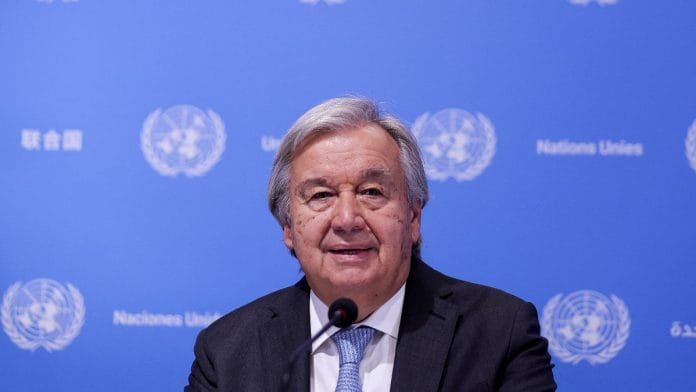New Delhi: After the world experienced two hottest days on record consecutively on 21 and 22 July, the United Nations Secretary-General António Guterres has issued a call for action to curb extreme heat.
In a report released Thursday, the UN Secretary-General, International Labour Organization (ILO), UNESCO, WHO, and other UN offices came together to warn against the impact of extreme heat on health, economy and ecosystems.
“One thing that unites our divided world is that we are all increasingly facing this heat,” said Guterres in a press conference marking the report’s release.
He outlined the four main areas of focus: caring for the vulnerable; protecting workers; boosting societies’ resilience using data and science; and limiting the global temperature rise to 1.5℃.
The report began with the fact that extreme heat has caused more than 400,000 deaths each year globally from 2000 to 2019, with 45 percent of these occurring in Asia. Heat is also the leading cause of all extreme-weather-related deaths, it said.
Rajasthan’s Churu featured in the list of 10 places globally that have experienced temperatures higher than 50℃, along with Death Valley in the US and Sanbao in China.
Along with the call-to-action report, the ILO also released a study that said 2.4 billion workers globally were now at high risk of extreme heat – this, too, highlighted the dominant effect on people in Asia and Africa, compared to other parts of the world.
Labour productivity drops by 50 percent when temperatures rise above 34℃, and by 2030 the world will lose about $2.4 trillion due to this, the ILO said.
Both the UN report and Gueterres’ speech Thursday underlined the unequal impact of extreme heat on everything from labour productivity to schools and health. The call to action urged countries to develop climate action plans with adaptation and mitigation measures for dealing with heat waves and rising temperatures. Guterres also emphasised the need for climate finance and action against rising fossil fuel consumption. “Extreme heat is just one symptom of climate change, along with rising sea levels, fierce hurricanes, floods, droughts, wildfires,” said Gueterres in his address. “To tackle all this, we need to fight the disease — the addiction to fossil fuels and climate inaction.”
Also read: ‘Just want to convert Nicobar into Singapore’ — why the island project is a ‘monumental folly’
Heat action plans, low-carbon cooling
Further, the report pointed out that extreme heat impacted food production, with over 12 percent of globally-produced food being destroyed due to a lack of cooling. It quoted a Lancet study on how 125 million people slipped into moderate to severe food insecurity between 2010 and 2021. Another issue addressed by the report was the effect on education especially in vulnerable countries. Over 80 million children in Asia and Africa were already impacted by school closures due to extreme heat in 2024, said the study.
Gueterres’s address was as much a reminder of current temperatures and statistics as a warning for what was about to come. He spoke about the need to act now and adapt our societies, economies and systems to these temperatures that would only rise further.
Data from the World Meteorological Organization and the Intergovernmental Panel on Climate Change showed that “future generations will see significantly hotter and more dangerous temperatures than today”.
The only solution forward, said Guterres, was to focus on low-carbon cooling, natural cooling, early heat warning systems and building heat-resilient infrastructure.
Currently, 20 percent of the world’s total electricity is consumed for cooling purposes, and by 2050 the installed cooling capacity will triple. By reducing fossil fuel use, investing in heat-reflective architecture and energy efficiency in cooling systems, the 2050 projected emissions could be reduced by 60 percent. The report also said that scaling up health-warning systems in 57 countries could save more than 90,000 lives yearly.
“We all know anthropogenic, fossil-fuel-charged climate change is driving this heat, and we need to address this to actually tackle global heat,” said Guterres. He stressed the need for low-carbon and energy-efficient cooling systems, as well as the rapid phase-out of fossil fuel use in “some of the wealthiest countries in the world”.
He also called upon G20 countries to end fossil fuel subsidies and to act urgently to limit global warming to 1.5℃ above pre-industrial levels. Guterres said that COP29, scheduled for November 2024 in Azerbaijan, should see a strong financial outcome, especially with developed countries “leading the way”.
On action on fossil fuel usage, the report urged reducing coal drastically through this century, while also acting on other high-emissions substances like methane, black carbon and ozone.
“Climate change is currently running faster than all measures that are being put in place to fight it,” Guterres said in his speech.
(Edited by Tikli Basu)
Also read: Ice sheets in West Antarctica melting faster than in East, reason may lie in the origin story






